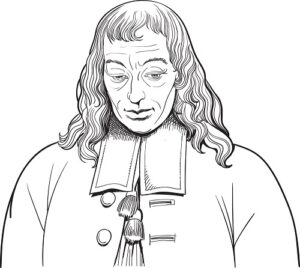A brief essay on The Thoughts of Blaise Pascal
Blaise Pascal plumbs the depths of the human condition and establishes the logic of conservatism by examining hard choices in high-stakes situations. Pascal expresses his insights in brilliant pensées—fireworks of thought.

Let me focus on Pascal’s thoughts about two kinds of hard choices: (a) Who shall rule? (b) How shall I behave if God’s existence is uncertain?
Pascal’s general approach to hard choices is to clarify the limits of reason and the power of psychology, the better to chart a narrow path for rational choice: “There is nothing so conformable to reason as the disavowal of reason.” Pensée no. 272
Knowledge is incomplete. A (partial) increase in one’s knowledge tends to induce overconfidence. Wisdom consists in cognitive humility—an elusive frame of mind for intellectuals:
Who shall rule?
Pascal foreshadows the conservative principle, Chesterton’s fence. One should hesitate to change a rule, or to break with tradition, unless one understands the origin or function of the rule or tradition.
Pascal makes a case that traditions deserve legitimacy. Traditions have stood the test of time because they reduce conflict: “Do we follow ancient laws and opinions because they are more sound? No; but because they stand alone and take from us the root of diversity [conflict].” Pensée no. 589
Pascal then illustrates the conservative principle’s function by concrete analysis of a fundamental political institution in early modern Europe: monarchy with dynastic succession by primogeniture:
Here Pascal foreshadows Nobel Laureate Thomas C. Schelling’s theory of the crucial role of salient focal points in strategic interaction and conflict resolution. Salience is psychological, not strictly logical. If there exists a clear, preferably unique, focal point, it can forestall or overcome bargaining impasses and self-serving conceptions of justice. If the focal point is recurrent—for example, primogeniture—it may readily become a tradition, a Chesterton fence.
How shall I behave if God’s existence is uncertain?
‘Pascal’s Wager,’ his most famous pensée, deploys both the logic of games of chance, and the psychology of belief-formation, to try and convince freethinkers to bet on God, and to dupe themselves!
Pascal’s interlocutor is someone who does not believe in God. Their dialogue has three background empirical premises:
- If God exists, then belief in God is a necessary condition for salvation in the afterlife.
- One cannot prove the existence of God.
- One cannot simply decide to believe.
Given these premises, Pascal first makes a gambler’s case that it would be prudent to believe in God. Pascal makes an appeal to interest, not evidence:
“Let us then examine this point, and say, ‘God is, or he is not.’ But to which side shall we incline? Reason can determine nothing about it. There is an infinite gulf fixed between us. A game is playing at the extremity of this infinite distance in which heads or tails may turn up. What will you wager? [… .]
Let us weigh the gain and the loss in choosing heads that God is. [… .] But there is here an infinity of an infinitely happy life to win, a chance of gain against a finite number of chances of loss, and what you stake is finite; that is decided. Wherever the infinite exists and there is not an infinity of chances of loss against that of gain, there is no room for hesitation, you must risk the whole. [… .]
Every gambler stakes a certainty to gain an uncertainty, and yet he stakes a finite certainty against a finite uncertainty without acting unreasonably. [… .] So that our argument is of infinite force, if we stake the finite in a game where there are equal chances of gain and loss, and the infinite is the winnings. This is demonstrable, and if men are capable of any truths, this is one.” Pensée no. 233
The intuition is that any positive chance at an infinite reward has infinite value, and so trumps any finite worldly pleasures here and now.
Pascal’s wager triggered an ongoing avalanche of analysis of the logic of ‘expected utility.’ It gets complicated fast. Let me mention just a few issues for flavor. What if God exists, but punishes gamblers? What if a gambler has a high ‘discount rate’ (i.e., cares about the present, not the afterlife)? What if there are many Gods?
Howsoever that may be, Pascal is certain that he has got the gambler’s attention. A quandary—a psychological challenge—then naturally arises. If it would be prudent to believe in God, but there is no proof of God and one cannot simply decide to believe in God, then what is a non-believer to do?!
Pascal’s answer is to take steps to dupe oneself by going through the motions of religious practice:
“I confess and admit it [that belief in God would be prudent]. Yet is there no means of seeing the hands at the game? — Yes, the Scripture and the rest, etc. — Well, but my hands are tied and my mouth is gagged: I am forced to wager and am not free, none can release me, but I am so made that I cannot believe. What then would you have me do? [… .]
Labor then to convince yourself, not by increase of the proofs of God, but by the diminution of your passions. You would fam arrive at faith, but know not the way; you would heal yourself of unbelief, and you ask remedies for it. Learn of those who have been bound as you are, but who now stake all that they possess; these are they who know the way you would follow, who are cured of a disease of which you would be cured. Follow the way by which they began, by making believe that they believed, taking the holy water, having masses said, etc. Thus you will naturally be brought to believe, and will lose your acuteness. — But that is just what I fear. — Why? what have you to lose?
The last process of reason is to recognize that there is an infinity of things which transcend it; it is but weak if it does not go so far as to know that.” Pensée no. 233
The psychological thesis is that faking it is transformative. Going through the motions will eventually (a) dull one’s critical faculties, (b) erase one’s awareness of faking it, and (c) induce faith. The rational, self-interested choice is to submit to tradition as a means to psychological transformation.
Pascal’s thoughts about politics (legitimacy of dynastic succession) and about religion (prudent make-believe to achieve faith)—his thoughts about hard choices in high stakes situations—unflinchingly demonstrate the limits of reason and strategically enlist rational choice and psychology to harness traditions. The Pensées are the dawn of the modern conservative mind.
John Alcorn is Principal Lecturer in Formal Organizations, Shelby Cullom Davis Endowment, Trinity College, Connecticut. Scruples about principles of historical inquiry, and a stint teaching in Columbia’s ‘great books’ core curriculum led him to explore methodological individualism and the social sciences. As in the Dry Bones song, a concatenation of authors—Jon Elster, Diego Gambetta, Thomas C. Schelling, Robert Sugden, David Friedman, and Michael Munger—eventually brought him to discover EconTalk and EconLog.


READER COMMENTS
john hare
Oct 15 2023 at 6:53pm
“””If God exists, then belief in God is a necessary condition for salvation in the afterlife.””””
This is a sticking point for me. Lack of solid evidence in this life could easily have one believe something actually counter to Gods’ desires. The relevant truths will be known instantly in the afterlife.
Robert Landbeck
Oct 18 2023 at 1:08pm
The ‘wager’ is a self deception. For it presupposes that the theology behind ‘belief’ is sound! That is most doubtful. One may better question whether theology is even a valid human intellectual endeavor? Thus to say one claims to believes in God or professes atheism, or anything inbetween makes no difference at all. For human nature itself exists in perfect ignorance of that possible ultimate reality. And attempting to fill that intellecutal vacuum with a theological construct or a rationalizing unbelief is meaningless, self deceiving and self defeating!
Monte
Oct 16 2023 at 7:43pm
This cannot be overstated. Traditions bring us together, reinforce values, and facilitate progress through peace. Hayek certainly understood their implications for prosperity:
Brilliant minds seem to suffer from an unquenchable thirst for the truth and life’s purpose. Thus with Pascal. I ask myself, “Who am I to refute the existence of God when he (and so many others) wouldn’t?”
steve
Oct 16 2023 at 10:36pm
So people should have stayed with traditional farming methods and rejected the new idea of crop rotation in the Agricultural Revolution? So since agricultural work was the tradition people should not have left to go work in the factories? In the middle Ages/pre-industrial 80% or so of people were peasants.
“The open field system of agriculture dominated most of Europe during medieval times and endured until the nineteenth century in many areas. Under this system, peasants lived on a manor presided over by a lord or a bishop of the church. Peasants paid rent or labor services to the lord in exchange for their right to cultivate the land. Fallowed land, pastures, forests, and wasteland were held in common. The open field system required cooperation among the peasants of the manor.[14] It was gradually replaced by individual ownership and management of land.”
So is it the tradition from that era we like or the one after?
Steve
John Alcorn
Oct 17 2023 at 6:06pm
Pascal asks, What is the rational choice?, about great issues of his war-torn time (succession, religion). He reckons with established traditions (primogeniture, Church practices).
Pascal was also a major innovator; for example, in the theory of probability and in the development of calculator-machines.
Pascal charts the limits of reason in order to demarcate the proper terrain of rationality. He then follows rationality where it leads. My intuition is that Pascal’s method doesn’t stack the deck against economic innovation and migration.
Greg G
Oct 18 2023 at 3:43pm
Whether or not I believe something depends entirely on whether or not my intuitions after examining the evidence cause me to feel it is likely to be true or not. This is an entirely different matter than whether or not I think the believing in the thing would be prudent or beneficial.
I vividly remember the joy I got as a child from believing in Santa Claus but even my sincere desire to recover that joy was not nearly enough to restore the belief.
No doubt we all do often succeed in sincerely convincing ourselves of various things that we wish to be true. It is something quite different for Pascal to propose the we can simply knowingly choose a belief because we want it to be true. Once I become conscious I am trying this, that awareness increases my doubt, not my belief.
It seems even less likely that an all knowing God would reward me for faking a belief He knew I never really held.
Andrew
Oct 20 2023 at 10:25am
I am curious about the locution “the origin or function of the rule or tradition.” Does the “or” here function like the Latin vel, indicating that the origin and the function have two different referents (disjunction), or like Latin sive, indicating synonymy between function and origin (apposition)? I’m inclined to believe the former: the origin of a rule is neither necessary nor sufficient to determine its legitimacy and serves at best as a heuristic, but the function of a rule is necessary, but not sufficient, to determine its legitimacy- there are normative considerations to be taken into account!
John Alcorn
Oct 21 2023 at 9:22am
Good eye!
I should have clarified that knowledge of the history of a rule (or tradition) might illuminate a rule’s function and value—or anachronism, as the case may be.
See C. Behan McCullagh, The Logic of History (Routledge, 2004), Chapter 3 (“Justifying Historical Descriptions”) and Conclusion.
Comments are closed.